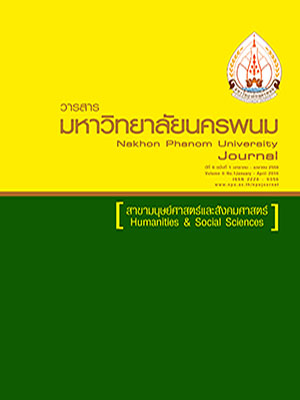วัจนกรรมในบทเพลงปลุกใจให้รักชาติ ระหว่าง พ.ศ.2510–2550
Main Article Content
Abstract
งานวิจัยนี้มีวัตถุประสงค์เพื่อศึกษาประเภทของวัจนกรรมที่ปรากฏในเพลงปลุกใจให้รักชาติ วิธีดำเนินการวิจัย คือการตรวจเอกสารจากแหล่งต่างๆ แนวคิดเกี่ยวกับเพลงปลุกใจ แนวคิดเกี่ยวกับความเปลี่ยนแปลงทางสังคม ทฤษฎีวัจนปฏิบัติศาสตร์และการแบ่งประเภทวัจนกรรมของ John R. Searle และใช้เกณฑ์การวิเคราะห์วัจนกรรมตามเจตนาของการสื่อสารโดยใช้แนวคิดของ John R. Searle ซึ่งเสนอหลักการวิเคราะห์ที่เรียกว่าเงื่อนไขวัจนกรรม (Speech Act Condition) รวมทั้งแนวคิดการแบ่งประเภทวัจนกรรม ของนภัทร อังกูรสินธนา และ วิสันต์ สุขวิสิทธิ์ เป็นแนวทางการศึกษา ผลการศึกษาพบว่าประเภทวัจนกรรมโดยศึกษาเฉพาะความหมายประจำ รูปประโยค แบ่งได้เป็น 12 ประเภท ได้แก่ วัจนกรรมการบอกเล่า (Affirmative) วัจนกรรมการขอร้อง (Requesting) วัจนกรรมการสั่ง (Commanding) วัจนกรรมการเตือน (Warning) การสัญญา (Promising) วัจนกรรมการขู่ (Threatening) วัจนกรรมการแนะนำ (Advise) วัจนกรรมการถาม (Question) วัจนกรรมการแสดงความเสียใจ (Expressing Condolences) วัจนกรรมการบริภาษ (Reprimanding) วัจนกรรมการท้าทาย (Challenging) และวัจนกรรมการอวยพร (Wishing) วัจนกรรมที่พบมากที่สุดได้แก่ วัจนกรรม การบอกเล่า รองลงมา วัจนกรรมการสัญญา และพบน้อยที่สุด วัจนกรรมการถาม
The objective of this study aimed to investigate types of speech acts which appeared in patriotic songs. The research procedure used was a review of documents from various sources about the concept of patriotic songs, the concept of social change, John R. Searle’s theory of speech pragmatics and assortment of speech acts, and employing the criteria for analyzing speech acts based on the intent of communication using the concept of John R. Searle who offered the principles of analysis as called speech act condition. This study also used the concept of assortment of speech acts of Naphat Angkoolsinthana and Wison Sukwisit as an approach. The findings of study showed that the types of speech acts as investigated from the specific meaning of a sentence could be divided into 12 types of speech acts, namely affirmative, request making, commanding, warning, promise making, threatening, advice giving, questioning, condolence expressing, reprimand giving, challenging and wishing. The speech acts found most were affirmative, followed by explanation and the one found least was questioning.


